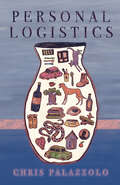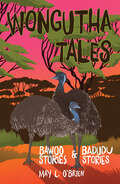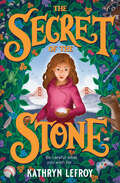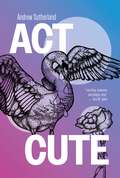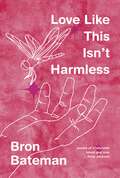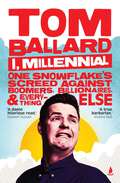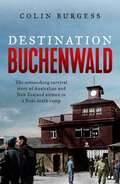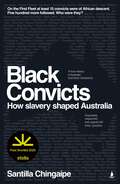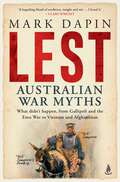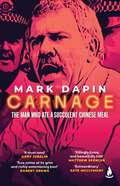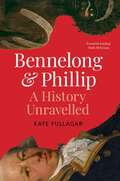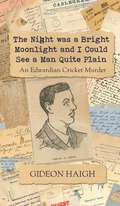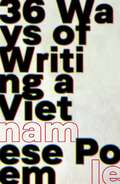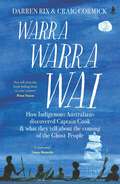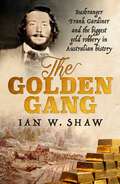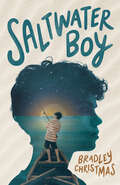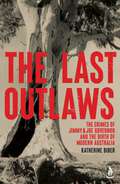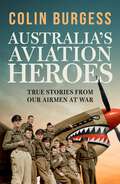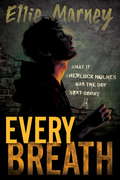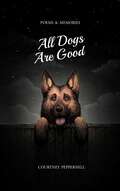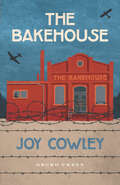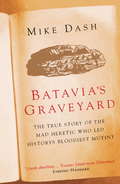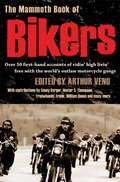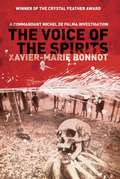- Table View
- List View
Personal Logistics
by Chris PalazzoloPersonal Logistics is a collection about men and industry, about enterprise and survival, and about the insignificance of the individual in place and time. The collection details the poet' s experiences and observations of life in the East Kimberley, as someone who has worked as a farmhand and as a stay-at home dad. Coursing through the collection, in both the wet season and the dry, is the theme of the relation between naturally flowing water and hydroelectricity, without which Kununurra, where the poet resides, would be considerably less hospitable.
Wongutha Tales
by May O'BrienFirst published as individual titles in 1992, May O' Brien' s stories were ground-breaking publications, presenting traditional Indigenous stories in a bilingual text and giving a unique insight into learning English as a second language from a First Nations perspective. Classic tales such as How Crows Became Black and Why the Emu Can' t Fly are still as fresh and appealing as ever for a new generation of junior readers. Plus May' s simple pronunciation guide for Wongutha words are perfect learning activities for the classroom.
The Secret of the Stone
by Kathryn LefroyWhen Olive and her friends find a mysterious stone and discover it grants wishes, they think their lives are made. Sure, they' re going to save the world and all that stuff, but there are a few fun things they want to do first.Then they realise other people are looking for the stone. People who will stop at nothing to get it ... As the stakes become more dangerous, secrets are kept, loyalties are questioned, and promises are broken. How much are Olive and her friends willing to risk to make all their dreams come true?
Act Cute: Queer POZ poetry
by Andrew SutherlandThe second poetry collection from Queer Poz (PLHIV) writer and performance-maker. In Act Cute, the poet addresses the gap between memory and the present, and asks how to perform a coherent self amidst the forces of nostalgia, institutional entanglements and reckonings, and queer desiring. Shifting between autofictive address and canonical personae, the structural codes of romantic drama uneasily frame the poet-as-actor through five sections, titled 'Audition Sides', 'you stop me at the airport and tell me that you love me', 'twink death in Europa!!', 'Wedding Scenes' and 'forgiveness'.
Love Like This Isn't Harmless: Feminist, Crip poetry
by Bron BatemanThrough a fiercely feminist lens, Bateman's latest collection of poems confronts tough themes like sexual abuse and domestic violence with unapologetic honesty and profound insight. From intimate portrayals of family dynamics to reimaginings of mythos, these poems will spark conversation and contemplation.
I, Millennial: One Snowflake's Screed Against Boomers, Billionaires and Everything Else
by Tom Ballard&‘A damn hilarious read.&’ Nazeem Hussain &‘A true barbarian.&’ Andrew Bolt Our world is in chaos lol. And no, Australian Millennials, it&’s not your imagination: things are especially f**ked for us. Millions of Baby Boomers got beach houses, free education, jobs for life and a franking credit-fed retirement. But Millennials have been handed a housing crisis, crippling student debt, the gig economy, a cooked planet, a truly broken political system and now wars, inflation and a global pandemic, as a treat.This fully sucks. But never fear – this book is going to fix everything. Through the power of jokes, history, interviews and sass, so-called comedian Tom Ballard unpicks how his generation got here, and explains why we should probably do a revolution. Fact-filled and furiously funny, this is a must-read not just for young people wondering why they&’ve been given such a raw deal, but for anyone with an interest in how we&’re making our collective future impossible. &‘Tom Ballard is one of the most original, fearless and hilarious voices in Australian comedy.&’ Wil Anderson &‘As a fellow beleaguered Millennial, Tom is exactly the voice we need in this time of wailing capitalist death throes. Funny but biting, he lays out how the system has screwed us all – and it has nothing to do with avocado toast. You&’ll never be able to afford a house, so spend your money on this book instead.&’ Amy Remeikis &‘Ballard is fuming, funny, and armed with facts.&’ Tom Tilley &‘Speaking as Tom&’s non-biological mother, I am naturally proud to bursting of everything he does, especially the gay sex and particularly the class consciousness, which you will find emerging in this book.&’ Helen Razer &‘Tom makes me laugh, and think. I&’m not sure in which order. This book might be his last but that&’s ok – he&’s nailed it.&’ Dave Hughes
Destination Buchenwald: The astonishing survival story of Australian and New Zealand airmen in a Nazi death camp
by Colin BurgessThe harrowing story of the Allied airmen who experienced the true horrors of Nazism firsthand. It was the summer of 1944 as liberating Allied forces surged towards Paris following the D-Day landings. For a large group of downed airmen being held in that city&’s infamous Fresnes Prison, they were about to face evacuation into the blackest, bloody heart of Germany and experience the most acute evil of the war. Amid great secrecy, those 168 airmen – including several from Australia and New Zealand – were transported on a filthy, overcrowded nightmare train journey which ended at the notorious Buchenwald concentration camp, accompanied by orders for their execution. At Buchenwald they witnessed extreme depravity that would haunt them to the end of their days. Yet, on returning home, they were confronted by decades of denials from their own governments that they had ever been held in one of Hitler&’s most vile concentration camps. In conducting his original deep research for this book – now completely expanded and updated – Colin Burgess personally interviewed or corresponded with dozens of the surviving airmen from a number of nations, including their valorous leader, New Zealand Squadron Leader Phil Lamason. Destination Buchenwald tells a compelling story of extraordinary bravery, comradeship and endurance, when a group of otherwise ordinary servicemen were thrust into an unimaginable Nazi hell. 'This was the first book to provide an insight into our experiences as a group of captured allied airmen, betrayed to the Gestapo, tortured and deported to Buchenwald concentration camp. I consider it to be one of the best interpretations of the events as it reflects the voices of the survivors and their challenges to stay alive in such dehumanising circumstances.' Sqn Ldr Stanley Booker, RAF (Rtd.), MBE, Légion D'Honneur: Last surviving member of the Buchenwald airmen
Black Convicts: How slavery shaped Australia
by Santilla ChingaipeThe story of Australia&’s Black convicts has been all but erased from our history. In recovering their lives, Santilla Chingaipe offers a fresh understanding of this fatal shore, showing how empire, slavery, race and memory have shaped our nation. On the First Fleet of 1788, at least 15 convicts were of African descent. By 1840 the number had risen to almost 500. Among them were David Stuurman, a revered South African chief transported for anti-colonial insurrection; John Caesar, who became Australia&’s first bushranger; Billy Blue, the stylishly dressed ferryman who gave his name to Sydney&’s Blues Point; and William Cuffay, a prominent London Chartist who led the development of Australia&’s labour movement. Two of the youngest were cousins from Mauritius—girls aged just 9 and 12—sentenced over a failed attempt to poison their mistress. But although some of these lives were documented and their likenesses hang in places like the National Portrait Gallery, even their descendants are often unaware of their existence. By uncovering lives whitewashed out of our history, in stories spanning Africa, the Americas and Europe, Black Convicts also traces Australia&’s hidden links to slavery, which both powered the British Empire and inspired the convict system itself. Situating European settlement in its global context, Chingaipe shows that the injustice of dispossession was driven by the engine of labour exploitation. Black Convicts will change the way we think about who we are.
Lest: Australian War Myths
by Mark DapinFrom Simpson&’s donkey and the Emu War to Vietnam and Ben Roberts-Smith, Australian military history is full of events that didn&’t happen the way most people think they did. In his inimitable style, award-winning author Mark Dapin sets the record straight. Australia has many stories and statues &‘lest we forget&’ our military past. But from Simpson&’s donkey to Ben Roberts-Smith, our history is full of events that didn&’t happen the way most people think they did. The first Anzac Day, for example, was far from being a solemn march – it was a celebration where people dressed as cavemen and dinosaurs, among other things. And is it true that British officers callously dispatched Australian soldiers to their deaths in the Dardanelles, as we&’ve been told? Did we really hate the soldiers returning from Vietnam? Were the white-feather women of the First World War fact or fiction? In his inimitable style, award-winning author and historian Mark Dapin sets the record straight, showing that the reality was often completely different from the myth – and that in celebrating the wrong people we often overlook the real heroes. &‘With Lest, Mark Dapin transforms his trademark humour into serious history … It forces us to look again at stories we think we all know – or should know – and reframe them with intellectual rectitude and rigour … Lest offers new perspectives on the past from one of Australia&’s most interesting and provocative thinkers.&’ Clare Wright
Carnage: A succulent Chinese meal, Mr Rent-a-Kill and the Australian Manson murders
by Mark DapinMillions have been entertained by the viral video of a man being arrested after a &‘succulent Chinese meal&’. But when Mark Dapin investigated, it emerged that this man's story went to the heart of the Australian underworld. A true crime cult classic in the making. Whether you know it as the &‘succulent Chinese meal&’ video, or &‘democracy manifest&’, chances are you have seen the video of baritone larrikin Jack Karlson getting arrested outside a Brisbane Chinese restaurant in 1991. The Guardian called it &‘perhaps the pre-eminent Australian meme of the last 10 years&’. When Karlson called crime writer Mark Dapin out of the blue, though, Dapin hadn&’t heard of him. But there was enough that intrigued him about this theatrical outlaw to continue the conversation. Over the following months emerged a dark and complex past. It turned out that Karlson had been in the background of many notorious incidents in late-twentieth century Australian crime, from collaborating with infamous prison-playwright Jim McNeil to befriending hitman Christopher Dale Flannery (Mr Rent-a-Kill). But most shockingly of all, Karlson&’s life story led Dapin to shed new light on a number of unsolved murders, by two serial killers.The result is an extraordinary, deeply revealing portrait of Australian crime from the 60s to the 2010s – a portrait of carnage. &‘Mark Dapin could never be accused of glorifying crime, but he is guilty as sin for understanding it. Inhabited by flawed humans, filled with violence, humour, tears and dreams, Carnage is a classic Australian crime story.&’ Gary Jubelin, author of I Catch Killers 'True crime at its grim and richly entertaining best, and – let&’s face it – its truest.&’ Robert Drewe, author of The Shark Net &‘If ever there was a book crammed with colourful villains who are &“mad, bad and dangerous to know,&” it&’s definitely Mark Dapin&’s extraordinary book, Carnage.&’ Kate McClymont, author of He Who Must Be Obeid &‘Carnage is a window into Australian mayhem, killingly funny and beautifully told. Dapin finds pathos in a twisted world.&’ Matthew Spencer, author of Black River &‘Carnage begins by probing what seems a minor curiosity – an internet meme centred on a colourful character – then takes a turn into the lives of traumatised youths hurled without care or thought into brutalising reformatories. From there they graduate to rorts, robberies, violence. Bleak lives interspersed with occasional forays into squaresville – spouses, kids, even jobs – and attempts at betterment via theatre and literature. A unique, deeply felt take on the Australian underworld.&’ Peter Doyle, author of Crooks Like Us &‘The moment I start reading anything by Mark Dapin I&’m captivated, intrigued and engaged for the entire journey. There is no finer writer documenting the history and characters of Australian criminality.&’ Stuart Coupe
Bennelong and Phillip: A History Unravelled
by Kate FullagarThe first joint biography of Bennelong and Governor Arthur Phillip, two pivotal figures in Australian history – the colonised and coloniser – and a bold and innovative new portrait of both.Australian Book Review Books of the Year 2023Sydney Morning Herald Best Reads of the Year for 2023 Bennelong and Phillip were leaders of their two sides in the first encounters between Britain and Indigenous Australians, Phillip the colony&’s first governor, and Bennelong the Yiyura leader. The pair have come to represent the conflict that flared and has never settled. Fullagar&’s account is also the first full biography of Bennelong of any kind and it challenges many misconceptions, among them that he became alienated from his people and that Phillip was a paragon of Enlightenment benevolence. It tells the story of the men&’s marriages, including Bennelong&’s best-known wife, Barangaroo, and Phillip&’s unusual domestic arrangements, and places the period in the context of the Aboriginal world and the demands of empire. To present this history afresh, Bennelong & Phillip relates events in reverse, moving beyond the limitations of typical Western ways of writing about the past, which have long privileged the coloniser over the colonised. Bennelong&’s world was hardly linear at all, and in Fullagar&’s approach his and Phillip&’s histories now share an equally unfamiliar framing.
The Night was a Bright Moonlight and I Could See a Man Quite Plain: An Edwardian Cricket Murder
by Gideon HaighGideon Haigh has written numerous acclaimed books on both cricket and true-crime – now he&’s unearthed a gripping story that combines the two, in a masterpiece of historical detective work that ties back to the origin of the Ashes … On the night of 23 September 1910, on a station 500km west of Brisbane, farm hand John Neil was beaten to death with a cricket bat. The prime suspect, George Vernon, was the fresh-faced twenty-four-year-old son of one of England&’s most famous amateur cricketers, and part of an Australian rural dynasty. The murder trial became one of Queensland&’s most sensational, for Vernon did indeed harbour a secret – but not a secret anyone suspected. And the crime was to have a shocking sequel. The Night was a Bright Moonlight and I Could See a Man Quite Plain concerns a brutal murder, but also the dark parts of empire, the blind side of justice and the sensational end of media – all linked back to the origin story of cricket&’s Ashes. Sparely written and copiously illustrated, it will keep you guessing to the end.
36 Ways of Writing a Vietnamese Poem
by Nam LeFifteen years after his best-selling, award-winning collection of stories The Boat, Nam Le returns to his great themes of identity and representation in a virtuosic debut book of poetry36 Ways of Writing a Vietnamese Poem, says Le, a Vietnamese refugee to Australia, is &‘the book I need to write. The book I've been writing my whole life&’. This book-length poem is an urgent, unsettling reckoning with identity and the violence of identity, embedded with racism, oppression and historical trauma. But it also addresses the violence in those assumptions – of being always assumed to be outside one&’s home, country, culture or language. And the complex violence, for the diasporic writer who wants to address any of this, of language itself. Making use of multiple tones, moods, masks and camouflages, Le&’s poetic debut moves with unpredictable and destabilising energy between the personal and political, honouring every convention of diasporic literature – in a virtuosic array of forms and registers – before shattering the form itself. Like The Boat, 36 Ways of Writing a Vietnamese Poem conjures its own terms of engagement, escapes our traps, slips our certainties. As self-indicting as it is scathing, hilarious as it is desperately moving, this is a singular, breakthrough book. 'Nam Le takes the English language to pieces and reassembles it with a virtuoso ease not seen since Finnegans Wake' J.M. Coetzee 'A masterly performance' David Malouf 'These poems seethe and sing' Cathy Park Hong
Warra Warra Wai: How Indigenous Australians discovered Captain Cook, and what they tell about the coming of the Ghost People
by Craig Cormick Darren RixFor the first time, the First Nations story of Cook&’s arrival, and what blackfellas want everyone to know about the coming of Europeans Both 250 years late and extremely timely, this is an account of what First Nations people saw and felt when James Cook navigated their shores in 1770. We know the European story from diaries, journals and letters. For the first time, this is the other side. Who were the people watching the Endeavour sail by? How did they understand their world and what sense did they make of this strange vision? And what was the impact of these first encounters with Europeans? The answers lie in tales passed down from 1770 and in truth-telling of the often more brutal engagements that followed. Darren Rix (a Gunditjmara-GunaiKurnai man, radio reporter and Archie Roach&’s nephew) and his co-author Craig Cormick travelled to all the places on the east coast that were renamed by Cook, and listened to people&’s stories. With their permission, these stories have been woven together with the European accounts and placed in their deeper context: the places Cook named already had names; the places he &‘discovered&’ already had peoples and stories stretching back before time; and although Cook sailed on, the empire he represented impacted the people&’s lives and lands immeasurably in the years after. &‘Warra Warra Wai&’ was the expression called to Cook and his crew when they tried to make landfall in Botany Bay. It has long been interpreted as &‘Go away&’, but is perhaps more accurately translated as &‘You are all dead spirits&’. In adding the First Nations version of these first encounters to the story of Australian history, this is a book that will sit on Australian shelves alongside Cook&’s Journals, Dark Emu and The Fatal Shore as one of our foundational texts.
The Golden Gang: Bushranger Frank Gardiner and the biggest gold robbery in Australian history
by Ian W. ShawThe first comprehensive biography of the godfather of Australian bushranging – Frank Gardiner – leader of the Lachlan gang and mastermind of the largest gold heist in Australian history. Atop the hierarchy of Australian bushrangers sits Ned Kelly – the ultimate outlaw – and just below him, the tragic figure of Ben Hall, who joined a gang led by a man whose name today is less well known, but in his time was much more famous than any other: Frank Gardiner. Mastermind of the largest gold robbery in Australia&’s history, Gardiner led an extraordinary life, the full telling of which is long overdue. In a tough country and among a group of tough men, Gardiner was the toughest of them all. But while he engaged in gunfights with police to evade capture, he was always courteous and could lay claim to never killing anyone, and never stole from those who couldn't afford to be robbed. He went by three different surnames in his lifetime and spent almost half of it behind bars, including at some of the colonies' most notorious penal institutions: the Pentridge Stockade, Cockatoo Island and Darlinghurst Gaol. But if Gardiner was never quite the Robin Hood he sometimes imagined himself to be, he was nevertheless a natural leader, and a man capable of inspiring a motley bunch of stockmen and drifters to become the most effective and successful bushranging gang in the country&’s history. His Lachlan gang operated with a clockwork efficiency that culminated in the robbery of the Gold Escort at Eugowra Rocks, and from 1861 to 1863 it held reign over the roads of the Western Plains of New South Wales.Richly detailed, The Golden Gang shines a new light onto Gardiner's remarkable life – one that ended in shocking tragedy – and reinstates him in the pantheon of Australian outlaw heroes.
Saltwater Boy
by Bradley ChristmasWhen Matthew's dad gets in trouble, he makes trouble for everyone else too. But with Dad in jail, Matthew and his mom have a chance to put their pieces back together. Mom makes plans for a summer down the coast, fixing up Grandpa's old place in an effort to make ends meet. The beach, the swirling rockpools, and the vast ocean offer new perspective and promise for Matthew as he strikes up a friendship with Bill, an old local who recognizes a fellow 'Saltwater Boy.' Bill shows Matthew how to find pippis and catch fish (and even make a few dollars from it). Bill becomes the paternal figure that Dad isn't—wise and patient—but Bill isn't welcomed in town, and Matthew begins to witness old rivalries and buried truths resurface. Then Dad gets out on parole, and his recklessness puts everything, and everyone, at risk. Heartfelt and poignant, this captivating coming-of-age story navigates the difficult terrain of fractured families, the lies that break, and the ties that bind.
The Last Outlaws: The crimes of Jimmy & Joe Governor and the birth of modern Australia
by Katherine BiberBrilliantly reconstructed from contemporary narratives, The Last Outlaws is both a gripping work of historical true crime and a richly revealing examination of our nation at its birth. The Chant of Jimmie Blacksmith meets Killing for Country. In the winter of 1900, Wiradjuri man Jimmy Governor and his brother Joe murdered nine people across New South Wales, in a rampage that caused panic in the colony on the cusp of nationhood. Triggered, it seems, by a racist incident, they killed men, women and children, evading a vast manhunt until they were eventually captured. Joe was shot in the open; Jimmy survived to be put on trial. Thus the last man to be outlawed in the colony was hanged in the new nation, meeting his end in Darlinghurst Gaol as the Federation decorations were taken down. The brothers&’ names still resonate, partly due to Thomas Keneally&’s novel The Chant of Jimmie Blacksmith and Fred Schepisi&’s subsequent film, but their story has remained distorted and obscure. Undertaken with the co-operation of the Governors' descendants, Katherine Biber&’s compelling reconstruction of events – from the murders themselves to Jimmy&’s eventual execution – brings this extraordinary story back to life. In doing so it sheds fresh, vivid light on the country that inspired and reacted to the murders. Not only did many of the lawyers and politicians involved also play key roles in Federation, but the case revealed in microcosm the psychology of the nascent nation: its attitudes to land and race; its anxiety about a wider First Nations insurrection; its obsession with paperwork and the emerging &‘sciences&’ of neuroanatomy and criminology; its nepotism, religiosity, sweeping police powers and sensationalist media. More powerfully than the story of Ned Kelly or the Anzacs, the fate of Jimmy Governor illuminates the origin story of the Australian nation. Populated by a cast of extraordinary characters and compelling detail, The Last Outlaws brings the energy of true crime into the telling of history, offering an electric new understanding of both our past and our present.
Australia's Aviation Heroes: True stories from our airmen at war
by Colin BurgessFrom the author of bestselling Sisters in Captivity, seven remarkable stories of men who served from WWI to Korea – their wartime exploits and achievements through aviation. Based on personal interviews conducted by the author over many years, Australia&’s Aviation Heroes celebrates the achievements of extraordinary men in extraordinary times. Meet Jack Treacy, the WWI fighter pilot who came perilously close to joining the Red Baron in his grave. Relive the story of Ernie Guest, a man determined to fly against all odds after storming into battle on the bloody shores of Anzac Cove, Gallipoli, on 25 April 1915. George Allan, the Scottish-born pilot who survived that same war, went on to become one of the great pioneers in Australian aviation history. Then there is the harrowing tale of Joe Herman, the bomber pilot blown out of his doomed aircraft over war-torn Europe without a parachute – who lived to tell his story. We get to know Clive Caldwell, Australia&’s greatest WWII fighter pilot, as well as Don Bennett, the Queenslander who developed and led Bomber Command&’s legendary Pathfinder Force. During the Korean War, Phillip Zupp was the first Australian to be recommended for a Purple Heart. These are the captivating stories of men who answered the call during desperate times, willingly taking to the dangerous skies.
Every Breath
by Ellie MarneyWhen James Mycroft drags Rachel Watts off on a night mission to the Melbourne Zoo, the last thing she expects to find is the mutilated body of Homeless Dave, one of Mycroft's numerous eccentric friends. But Mycroft's passion for forensics leads him to realize that something about the scene isn't right--and he wants Watts to help him investigate the murder. While Watts battles her attraction to bad-boy Mycroft, he's busy getting himself expelled and clashing with the police, becoming murder suspect number one. When Watts and Mycroft unknowingly reveal too much to the cold-blooded killer, they find themselves in the lion's den--literally. A trip to the zoo will never have quite the same meaning to Rachel Watts again...From the Hardcover edition. a great deal of angst and danger in Rachel's future . . . compensated for by some really hot moments with Mycroft while unchaperoned . . . But I can't give any more away!
All Dogs Are Good: Poems & Memories
by Courtney PeppernellWritten for anyone who has known the touch of a cold nose on their hand, the bark of a best friend, or the joy of a walk accompanied by a wagging tail, All Dogs Are Good pays tribute to the special bond we share with our canine companions.Filled with heartfelt poems and prose on the love, dedication, and laughter our dogs bring, as well as the unique lessons they teach us along the way, bestselling author Courtney Peppernell&’s vignettes of life with our dogs are a touching reminder of the gifts they give us during their journey on earth. Celebrating dogs everywhere, All Dogs Are Good is a collection dog lovers will hold in their hearts forever.
The Bakehouse
by Joy CowleyBert wants nothing more than to be old enough to fight in the war—to handle weapons, defend his country, and have a life filled with adventure. Little does he know that the secrets and danger of war don't always stay at the front line, and that one boy's actions can change everything.
Batavia's Graveyard
by Mike DashThe true story of the mad heretic who led history's bloodiest mutiny - 'An adult version of LORD OF THE FLIES that is, moreover, entirely true' Evening StandardWhen the Dutch East Indiaman Batavia struck an uncharted reef off the new continent of Australia on her maiden voyage in 1629, 332 men, women and children were on board. While some headed off in a lifeboat to seek help, 250 of the survivors ended up on a tiny coral island less than half a mile long. A band of mutineers, whose motives were almost beyond comprehension, then started on a cold-blooded killing spree, leaving fewer than 80 people alive when the rescue boat arrived three months later. BATAVIA'S GRAVEYARD tells this strange story as a gripping narrative structured around three strong principal characters: Francisco Pelsaert, the cultivated but weak-willed captain; Jeronimus Cornelisz, a sinister apothecary with a terrifying personal philosophy influenced by Rosicrucianism who set himself up as the ruler of the island; and Wiebbe Hayes, the only survivor with the courage to fight Jeronimus's band. The background to these events, including the story of the Dutch East India Company, and the discovery of Australia, is richly drawn.
The Mammoth Book of Bikers: Over 40 first-hand accounts of riding high, living free, with the world's outlaw motorcycle gangs (Mammoth Books #464)
by Arthur VenoThe definitive collection of first-hand accounts of the world's outlaw motorcycle gangs, with contributions by Sonny Barger, Hunter S. Thompson, Ed Winterhalder, William Queen and many moreOutlaw bikers consider themselves 'the last free people in society', unconstrained by the regulations that hem in ordinary citizens. And they guard their privacy jealously. Drawing on seventeen years of studying and participating in biker culture, the author has compiled this one-of-a-kind collection of original biker writing.Here are insider accounts of landmark incidents in biker folklore, including reprints of classic writing from biker-originated magazines, handouts, websites and books. Gangs featured include the Bandidos, the Hells Angels, Henchmen MC, the Outlaws, the Mongols, the Annihilators, the Diablos, the Gypsy Jokers, the Rebels, the Straight Satans and the Vagos. And with contributors such as Freewheelin' Frank (one-time secretary of the Hells Angels), Edward Winterhalder (among the most powerful members of the Bandidos) and Sonny Barger (founder of the Hells Angels). Also included are those rare accounts by outsiders who have succeeded in 'looking in' on the gangs: Hunter S. Thompson's Hells Angels: A Strange and Terrible Modern Saga; writing by William Queen, the undercover agent who infiltrated America's violent outlaw motorcycle gang the Mongols; and Daniel R. Wolf's account of riding with the Rebels.
The Voice of the Spirits: A Commandant Michel de Palma Investigation
by Xavier-Marie BonnotCommandant Michel de Palma follows an anonymous tip-off to a gated mansion by the coast and finds a body whose face is obscured by a fearsome tribal mask. Beneath it is a mysterious wound that could not have been caused by a bullet. Surrounded by scores of masks and painted skulls, de Palma hears the haunting strains of a primal flute from the floors above. With few leads to go on, de Palma delves into an account of the murdered doctor's voyage to Papua New Guinea seventy years earlier. But when his chief suspect is found dead, killed by the same method as Delorme, he begins to wonder whether the bodies on his hands are not the victims of spirits intent on revenge.
The Voice of the Spirits: A Commandant Michel de Palma Investigation
by Xavier-Marie BonnotCommandant Michel de Palma follows an anonymous tip-off to a gated mansion by the coast and finds a body whose face is obscured by a fearsome tribal mask. Beneath it is a mysterious wound that could not have been caused by a bullet. Surrounded by scores of masks and painted skulls, de Palma hears the haunting strains of a primal flute from the floors above. With few leads to go on, de Palma delves into an account of the murdered doctor's voyage to Papua New Guinea seventy years earlier. But when his chief suspect is found dead, killed by the same method as Delorme, he begins to wonder whether the bodies on his hands are not the victims of spirits intent on revenge.
